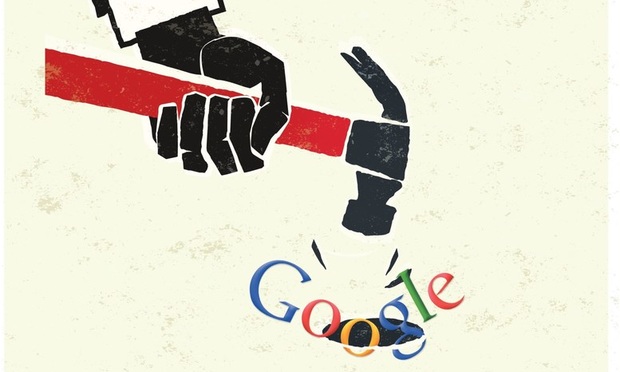Battling Bots in the Age of Automated DMCA Takedown Notices
Intellectual property and internet expert Annemarie Bridy breaks down why automation in law isn't always a great thing.
August 30, 2018 at 10:00 AM
6 minute read

Automation can save a world of trouble, but it can also cause quite the headache.
Just ask those served with bogus Digital Millennium Copyright Act (DMCA) takedown notices. These are the notices sent on behalf of rights holders to platforms hosting content they're accusing of infringing on copyrights. But in the Google age, things get a bit messy—bots are often trusted by rights holders in issuing notices, and while in theory this should expedite and maybe even simplify the process, it at times doesn't.
Legaltech News recently caught up with one of the forefront experts in both DMCA and automated notice sending, Annemarie Bridy, a University of Idaho College of Law professor who also works with Stanford's Center for Internet and Society. We picked her brain about out of control bots, DMCA takedowns' potential threat to freedom of speech and more. The conversation has been condensed for clarity.
LTN: How has the interplay between automation and issuing DMCA notices impacted the IP realm?
Annemarie Bridy: What we have been seeing over the course of the last five years or so are more and more vendors coming into the space of assisting right holders in managing infringement online.
In the early days of the bulk automated notice sending, what we saw were vendors that were really operating for the benefit of corporate right holders in a business environment. And I think when Google started its Trusted Copyright Removal Program for search, it had in mind it'd be working with vendors with a high level of sophistication who are operating in good faith and have skin in the game to the extent that they rely on relationships with Google and platforms to which they're sending notices.
We've seen this become a more lucrative space for vendors to enter into and serve small rights holders and individual artists. That's a good thing. But I think what's also happened is there's a lot of opportunism. Topple Track is a good example. They see an opportunity to make a lot of money, but lack the technical sophistication and the skin in the game the bigger vendors have.
Topple Track caused quite the stir in issuing bunk notices to Google over URLs. Will issues like that have an impact on the greater community of vendors in this space?
 Annemarie Bridy.
Annemarie Bridy.I doubt it. I think this is just a situation where people see there's money to be made, and they think they can do it quickly and cheaply, and they find out that things are a little more complicated than they thought. I do think it's good that when these more atrocious things happen, we get folks calling out abuse in this space, because a lot of folks don't know the law around this really well, don't have their mind around the scale at which these platforms operate.
It seems like it should be no big deal to get stuff taken down. Right holders in the piracy space keep hammering down how hard it is to take stuff down—there's billions of notices, billions of infringing of URLs. It's a healthy counterweight to that to understand the challenges platforms are facing, the room for abuse of the system in ways that impact a lot of noninfringing speech.
Was Google's launch of the trusted copyright removal program where things went wrong, or is there something greater at play here?
I think that's a little bit unfair. Google search is an extreme outlier in the takedown ecosystem. The amount of DMCA notices processed by Google search in an hour probably exceeds the total number of notices and takedown requests processed by most platforms in a year. Because Google deals with that at such an incredible scale, it needs to develop tools that may not be appropriate for use on other platforms.
A lot of the things Google is doing to assist rights holders in keeping content offline are things that it is in a position to do because it is a fabulously wealthy company. I do worry about the extent to which the sort of practices that Google is developing that are appropriate for its platforms are beginning to raise the bar for what other platforms are expected to do, and those other platforms may not have the resources that Google has.
Incomplete and bogus notices, incorrect parties—do you foresee this whole issue getting better or worse? Worse before it gets better?
I see it getting worse before it gets better, in part because the market takes a while to discipline bad actors. If there were stronger penalties in the DMCA for sending junk notices, that would be a way of disciplining these actors coming in at the bottom wanting to make a buck.
In the absence of seeing any kind of enhanced deterrents for sending junk notices, we're going to have to just fall back on the market to fix this. And it's unfortunate, because there is a need for services to serve rights holders who are not fabulously wealthy, who aren't Sony Music. As much as services like Topple Track are giving Google headaches, they're also not delivering services to the rights holders who need them. These fly-by-night operations that are just sending robots to do keyword searches benefit no one. They just cramp the market with low-quality services, and it'll take the market a while to sort that out.
What about the gravity of this mistake is in line with concerns over freedom of speech?
The incentives in the DMCA are structured to favor taking stuff down. You run risk if you don't take stuff down, you don't run any comparable risk if you do. Businesses are going to take stuff down. So what happens if you get taken down from Google? You might as well not exist. A lot of lawful expression could be blackballed if Google just decides it's going to remove all this stuff from its index and not carefully evaluate it.
Careless actors like Topple Track are just using unsophisticated technology. But then you have the people who want specific speech taken town, and they'll use the DMCA to do that, and that's a common enough thing. It's a system that as a whole has always been structured in a way where the incentives are aligned for take down. To the tune of millions of URLs a day, it's an exponentially greater risk.
This content has been archived. It is available through our partners, LexisNexis® and Bloomberg Law.
To view this content, please continue to their sites.
Not a Lexis Subscriber?
Subscribe Now
Not a Bloomberg Law Subscriber?
Subscribe Now
NOT FOR REPRINT
© 2025 ALM Global, LLC, All Rights Reserved. Request academic re-use from www.copyright.com. All other uses, submit a request to [email protected]. For more information visit Asset & Logo Licensing.
You Might Like
View AllTrending Stories
- 1Departing Attorneys Sue Their Former Law Firm
- 2Pa. High Court: Concrete Proof Not Needed to Weigh Grounds for Preliminary Injunction Order
- 3'Something Else Is Coming': DOGE Established, but With Limited Scope
- 4Polsinelli Picks Up Corporate Health Care Partner From Greenberg Traurig in LA
- 5Kirkland Lands in Phila., but Rate Pressure May Limit the High-Flying Firm's Growth Prospects
Who Got The Work
J. Brugh Lower of Gibbons has entered an appearance for industrial equipment supplier Devco Corporation in a pending trademark infringement lawsuit. The suit, accusing the defendant of selling knock-off Graco products, was filed Dec. 18 in New Jersey District Court by Rivkin Radler on behalf of Graco Inc. and Graco Minnesota. The case, assigned to U.S. District Judge Zahid N. Quraishi, is 3:24-cv-11294, Graco Inc. et al v. Devco Corporation.
Who Got The Work
Rebecca Maller-Stein and Kent A. Yalowitz of Arnold & Porter Kaye Scholer have entered their appearances for Hanaco Venture Capital and its executives, Lior Prosor and David Frankel, in a pending securities lawsuit. The action, filed on Dec. 24 in New York Southern District Court by Zell, Aron & Co. on behalf of Goldeneye Advisors, accuses the defendants of negligently and fraudulently managing the plaintiff's $1 million investment. The case, assigned to U.S. District Judge Vernon S. Broderick, is 1:24-cv-09918, Goldeneye Advisors, LLC v. Hanaco Venture Capital, Ltd. et al.
Who Got The Work
Attorneys from A&O Shearman has stepped in as defense counsel for Toronto-Dominion Bank and other defendants in a pending securities class action. The suit, filed Dec. 11 in New York Southern District Court by Bleichmar Fonti & Auld, accuses the defendants of concealing the bank's 'pervasive' deficiencies in regards to its compliance with the Bank Secrecy Act and the quality of its anti-money laundering controls. The case, assigned to U.S. District Judge Arun Subramanian, is 1:24-cv-09445, Gonzalez v. The Toronto-Dominion Bank et al.
Who Got The Work
Crown Castle International, a Pennsylvania company providing shared communications infrastructure, has turned to Luke D. Wolf of Gordon Rees Scully Mansukhani to fend off a pending breach-of-contract lawsuit. The court action, filed Nov. 25 in Michigan Eastern District Court by Hooper Hathaway PC on behalf of The Town Residences LLC, accuses Crown Castle of failing to transfer approximately $30,000 in utility payments from T-Mobile in breach of a roof-top lease and assignment agreement. The case, assigned to U.S. District Judge Susan K. Declercq, is 2:24-cv-13131, The Town Residences LLC v. T-Mobile US, Inc. et al.
Who Got The Work
Wilfred P. Coronato and Daniel M. Schwartz of McCarter & English have stepped in as defense counsel to Electrolux Home Products Inc. in a pending product liability lawsuit. The court action, filed Nov. 26 in New York Eastern District Court by Poulos Lopiccolo PC and Nagel Rice LLP on behalf of David Stern, alleges that the defendant's refrigerators’ drawers and shelving repeatedly break and fall apart within months after purchase. The case, assigned to U.S. District Judge Joan M. Azrack, is 2:24-cv-08204, Stern v. Electrolux Home Products, Inc.
Featured Firms
Law Offices of Gary Martin Hays & Associates, P.C.
(470) 294-1674
Law Offices of Mark E. Salomone
(857) 444-6468
Smith & Hassler
(713) 739-1250






